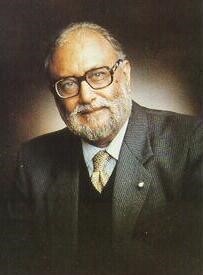A little bit of history: Abdus Salam and the creation of ICTP

A research institute that promotes basic science in developing countries. Today this is one of the main features of ICTP and ICTP-SAIFR. However, just over 50 years ago, this was just a dream that Pakistani physicist Abdus Salam had.
“The notion of a Centre that should cater particularly to the needs of physicists from developing countries had lived with me from 1954, when I was forced to leave my own country because I realised that if I stayed there much longer, I would have to leave physics, through sheer intellectual isolation”, he once said (Ideals and Realities 3rd ed., World Scientific, 392, 1989).

Abdus Salam’s first visit to Trieste, in 1960, for a Symposium on Elementary Particle Interactions
The history of ICTP began in 1960. This was the year Salam became professor of theoretical physics at Imperial College, where, together with Paul Matthews, he created a research group in this area. Also in 1960, Salam, as a delegate from Pakistan, proposed to the IAEA (International Atomic Energy Agency) the creation of an international center for theoretical physics.
Salam’s proposal was discussed and became a reality four years later. In 1964, the ICTP was founded in Trieste, Italy, and Salam became its director. At that time, due to the Cold War, Europe lived a great separation between the east and the west. Therefore, since its creation, ICTP became a rare line of communication between different countries.

ICTP’s first Scientific Council, in1964, chaired by Robert Oppenheimer
Over the next 50 years, ICTP maintained the ideal of its main creator. The Centre continued to bring together scientists from around the world and to promote basic science especially in developing countries. With the financial support of the Italian government, the IAEA and agencies such as UNESCO, the institute has helped more than 140,000 scientists to participate in conferences, workshops, courses and other events.
In 2010, ICTP, in collaboration with Universidade Estadual Paulista “Julio de Mesquita Filho” (Unesp) and with Fundação de Amparo à Pesquisa do Estado de São Paulo (FAPESP) created a new center, located in South America – the ICTP-SAIFR. The goal remains the same: to promote basic research at the highest international level, but this time with a special focus on South American countries.

Abdus Salam was awarded the Nobel prize in 1979, jointly with Steven Weinberg and Sheldon Glashow, for their contributions to the theory of the unified weak and electromagnetic interaction between elementary particles, including, inter alia, the prediction of the weak neutral current